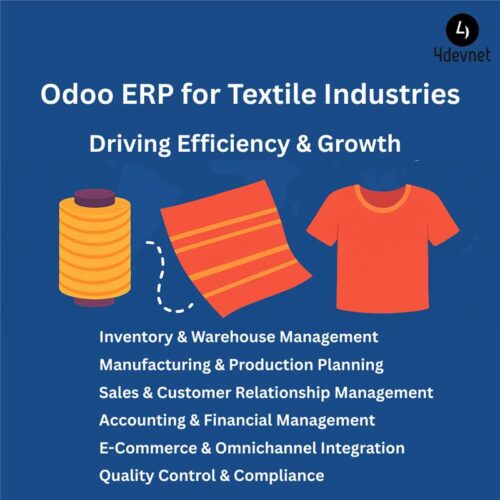Odoo ERP for Textile Businesses: Driving Efficiency & Growth
The textile industry is one of the most dynamic and competitive sectors globally, with major hubs in Surat, Ahmedabad, Tiruppur, Mumbai, New Delhi, Dhaka, Istanbul, Milan, New York, and Guangzhou. From raw material procurement to garment production and global distribution, textile businesses face complex operational challenges. Managing inventory, production, supply chains, and customer relationships efficiently is critical for staying competitive.
This is where Odoo ERP steps in as a transformative solution, helping textile businesses streamline operations, reduce costs, enhance productivity, and drive sustainable growth.
Why Textile Businesses Need Odoo ERP
Textile companies often deal with high-volume production, fluctuating demand, seasonal trends, and international orders. Traditional management systems struggle to keep up, leading to inefficiencies, errors, and missed opportunities. Odoo ERP addresses these challenges by:
- Centralizing Operations: All processes—from procurement and production to sales and finance—are integrated into a single platform, reducing operational silos.
- Automating Workflows: Order processing, invoicing, payroll, and inventory management are automated, saving time and minimizing human error.
- Enhancing Supply Chain Management: Real-time monitoring of raw materials, production progress, and deliveries ensures smooth operations and timely fulfillment.
- Enabling Data-Driven Decisions: Advanced analytics and reporting allow managers to forecast demand, optimize inventory, and improve resource allocation.
- Supporting Global Expansion: Multi-currency, multi-language, and international compliance features make it ideal for textile businesses in Dhaka, Milan, New York, and Guangzhou.
Key Odoo ERP Modules for Textile Businesses
- Inventory & Warehouse Management
Efficiently manage raw materials, fabrics, and finished products across multiple locations in Surat, Ahmedabad, and Tiruppur. Track stock levels, automate replenishments, and reduce overstocking or stockouts. - Manufacturing & Production Planning
Optimize production schedules, manage bills of materials, and monitor work orders. Reduce waste, enhance productivity, and ensure timely delivery in high-demand hubs like Tiruppur and Surat. - Sales & Customer Relationship Management (CRM)
Streamline sales processes, manage customer relationships, track orders, and implement targeted pricing strategies. Support both local clients in Mumbai and New Delhi and international buyers in Istanbul, Milan, and New York. - Accounting & Financial Management
Automate invoicing, payroll, and expense tracking for accurate financial reporting. Ensure compliance with local regulations in India, Bangladesh, and European markets. - E-Commerce & Omnichannel Integration
Connect ERP with online platforms to manage orders seamlessly. Expand market reach while integrating physical stores and digital channels, enhancing visibility in cities like Guangzhou and New York. - Quality Control & Compliance
Implement rigorous quality checks to maintain fabric standards, manage certifications, and comply with international regulations—vital for exports from hubs like Dhaka and Milan.
City-Specific Advantages of Odoo ERP for Textile Businesses
- Surat & Ahmedabad (India): Reduce lead times, streamline textile production, and optimize raw material procurement in India’s largest fabric hubs.
- Tiruppur: Efficiently manage knitwear manufacturing, inventory, and export operations.
- Mumbai & New Delhi: Handle large-scale domestic orders, retail distribution, and financial compliance.
- Dhaka (Bangladesh): Gain control over mass garment manufacturing, warehouse management, and global supply chain coordination.
- Istanbul & Milan: Improve responsiveness to fashion trends, manage European exports, and maintain high-quality standards.
- New York & Guangzhou: Enhance order processing, logistics management, and customer experience for global textile markets.
Driving Growth and Competitiveness
Implementing Odoo ERP empowers textile businesses to:
- Increase Efficiency: Automate repetitive tasks, optimize production workflows, and reduce operational bottlenecks.
- Reduce Costs: Minimize inventory waste, avoid overproduction, and optimize resource allocation.
- Enhance Quality: Implement consistent quality checks to ensure high-standard products for both domestic and international markets.
- Expand Market Reach: Manage multiple sales channels, e-commerce platforms, and international orders with ease.
- Enable Scalable Growth: Support expansion into multiple cities and countries while maintaining centralized control.
By adopting Odoo ERP, textile businesses in Surat, Ahmedabad, Tiruppur, Mumbai, New Delhi, Dhaka, Istanbul, Milan, New York, and Guangzhou can achieve operational excellence, improve customer satisfaction, and stay ahead in a highly competitive global market.
Conclusion
In today’s fast-paced textile industry, embracing digital transformation is not just a choice—it’s a necessity. Odoo ERP provides textile businesses with the tools to manage complex operations efficiently, optimize resources, and make data-driven decisions. Whether it’s enhancing production in Tiruppur, streamlining supply chains in Dhaka, or managing international sales in New York and Milan, Odoo ERP is the ideal solution to drive growth, profitability, and long-term success.


